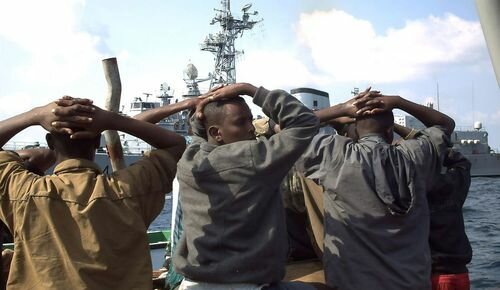International tribunal among options against Somali pirates – UN report.
 Bartamaha (Nairobi):- An international tribunal set up by the Security Council under Chapter VII of the United Nations Charter authorising the use of force is among several options to prosecute pirates operating off the Somali coast laid out by Secretary-General Ban Ki-moon in a new report made public on August 20 2010.
Bartamaha (Nairobi):- An international tribunal set up by the Security Council under Chapter VII of the United Nations Charter authorising the use of force is among several options to prosecute pirates operating off the Somali coast laid out by Secretary-General Ban Ki-moon in a new report made public on August 20 2010.
Piracy attacks have escalated worldwide in recent years, almost entirely made up of increasing numbers of incidents off of the coast of Somalia since the overthrow of Siad Barre’s regime in 1991, Ban said, according to the UN News Service
In 2008, 111 vessels were attacked, and that number nearly doubled to 217 in 2009.
“Bearing in mind that each incident involves a number of individuals, it is clear that there are large numbers of persons involved,” the Secretary-General said in the report, which will be discussed by the Security Council on August 25 2010.
Although the number of incidents continues to be high, increased naval patrols off the Horn of Africa and in the Gulf of Aden have helped reduce the success rate of these attacks.
In spite of this positive development, as of May, 450 people continue to be held hostage on ships captured by pirates off the Somali coast.
One of the seven options put forward by Ban in the new report – enhancing UN assistance to bolster regional states’ capacities to prosecute and imprison those behind acts of piracy and armed robbery at sea – has already been going forward.
In June, Kenya opened a new high-security courtroom, built by the UN Office on Drugs and Crime (UNODC), in the port town of Mombasa, which is intended to increase trial efficiency in the system and provide a secure, modern environment suitable for piracy cases.
Other options listed in the new report include creating a Somali court in the territory of another State in the region and setting up an international tribunal agreed upon by regional country and the UN.
Ban emphasised that arrangements for imprisonment are just as important as the prosecution of pirates, given the large numbers of suspects apprehended by countries’ navies.
Acknowledging the difficult current economic climate, he underlined the need for political and financial commitment from the international community to not only create a new judicial body, but also to sustain it.
“A new judicial mechanism to address piracy and armed robbery at sea off the coast of Somalia would be addressing a different situation to that addressed by the existing United Nations and United Nations-assisted tribunals,” Ban said. “Such a mechanism would face ongoing criminal activity and potentially a large caseload, with no predictable completion date.”
On August 17 2010, a United States. judge dismissed piracy charges against six Somali men accused of attacking a US Navy ship off the Horn of Africa in April, although the group still faces several lesser counts, VOANews said.
Attorneys for the men had argued that the defendants’ actions did not amount to piracy because they did not board or take control of the USS Ashland in the Gulf of Aden or take anything of value from it. US district judge Raymond Jackson in the eastern city of Norfolk, Virginia agreed, ruling that the government had failed to establish that any of the “unauthorised acts of aggression” committed constituted piracy under the law.
Prosecutors accused the six of opening fire on the Ashland from a small skiff. The US vessel returned fire, sinking the skiff and killing one occupant. All others on board were captured. The US justice department has declined to comment on the case.
On August 3, a Spanish warship stopped a pirate attack in the Gulf of Aden and captured seven suspects. The European Union’s anti-piracy force said that seven pirates in a small boat fired on a Norwegian chemical tanker, VOANews said.
Crew members on the tanker, the MV Bow Saga, called for help and used water hoses to prevent the pirates from boarding. A helicopter from the Spanish warship was able to intervene minutes after the attack was reported. The pirates attempted to flee, but were caught.
On August 2, Somali pirates hijacked a Panamanian-flagged cargo ship in the Gulf of Aden.
The European Union’s anti-piracy force said the MV Suez vessel was captured early on August 2.
The ship had a 23-member crew from Egypt, Pakistan, Sri Lanka and India.
The EU force said the ship’s crew called for help when the vessel came under attack by gunfire, but by the time a naval helicopter arrived, the pirates had seized control.
In mid-July, the International Maritime Bureau said that piracy attacks had declined worldwide during the first half of 2010. But the report said that Somali pirates were increasing their range and capabilities.
———————————–
Source:- Sofia echo.
Comments
comments
 Calendar
Calendar




































